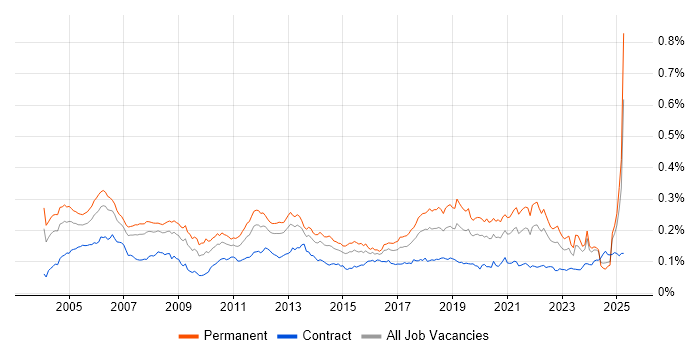Development Engineer
UK
The median Development Engineer salary in the UK is £62,500 per year, according to job vacancies posted during the 6 months leading to 30 April 2025.
The table below provides salary benchmarking and summary statistics, comparing them to the same period in the previous two years.
| 6 months to 30 Apr 2025 |
Same period 2024 | Same period 2023 | |
|---|---|---|---|
| Rank | 523 | 686 | 755 |
| Rank change year-on-year | +163 | +69 | +48 |
| Permanent jobs requiring a Development Engineer | 162 | 201 | 233 |
| As % of all permanent jobs advertised in the UK | 0.31% | 0.20% | 0.22% |
| As % of the Job Titles category | 0.34% | 0.22% | 0.24% |
| Number of salaries quoted | 27 | 81 | 142 |
| 10th Percentile | £39,750 | £35,000 | £46,250 |
| 25th Percentile | £50,625 | £47,500 | £55,000 |
| Median annual salary (50th Percentile) | £62,500 | £52,500 | £65,000 |
| Median % change year-on-year | +19.05% | -19.23% | +8.33% |
| 75th Percentile | £74,750 | £65,000 | £77,542 |
| 90th Percentile | £105,000 | £68,750 | £85,000 |
| UK excluding London median annual salary | £52,500 | £50,000 | £63,000 |
| % change year-on-year | +5.00% | -20.63% | +26.00% |
All Permanent IT Job Vacancies
UK
For comparison with the information above, the following table provides summary statistics for all permanent IT job vacancies. Most job vacancies include a discernible job title that can be normalized. As such, the figures in the second row provide an indication of the number of permanent jobs in our overall sample.
| Permanent vacancies in the UK with a recognized job title | 46,971 | 93,051 | 95,196 |
| % of permanent jobs with a recognized job title | 90.06% | 94.62% | 91.53% |
| Number of salaries quoted | 27,308 | 66,827 | 59,871 |
| 10th Percentile | £30,000 | £28,500 | £32,500 |
| 25th Percentile | £42,500 | £38,500 | £45,000 |
| Median annual salary (50th Percentile) | £57,500 | £52,750 | £60,000 |
| Median % change year-on-year | +9.00% | -12.08% | - |
| 75th Percentile | £75,000 | £71,250 | £81,250 |
| 90th Percentile | £97,500 | £90,000 | £100,000 |
| UK excluding London median annual salary | £52,344 | £50,000 | £52,500 |
| % change year-on-year | +4.69% | -4.76% | +5.00% |
Development Engineer
Job Vacancy Trend
Job postings that featured Development Engineer in the job title as a proportion of all IT jobs advertised.

Development Engineer
Salary Trend
3-month moving average salary quoted in jobs citing Development Engineer.
Development Engineer
Salary Histogram
Salary distribution for jobs citing Development Engineer over the 6 months to 30 April 2025.
Development Engineer
Top 14 Job Locations
The table below looks at the demand and provides a guide to the median salaries quoted in IT jobs citing Development Engineer within the UK over the 6 months to 30 April 2025. The 'Rank Change' column provides an indication of the change in demand within each location based on the same 6 month period last year.
| Location | Rank Change on Same Period Last Year |
Matching Permanent IT Job Ads |
Median Salary Past 6 Months |
Median Salary % Change on Same Period Last Year |
Live Jobs |
|---|---|---|---|---|---|
| England | +150 | 143 | £65,000 | +22.64% | 162 |
| UK excluding London | +176 | 138 | £52,500 | +5.00% | 91 |
| Midlands | +129 | 104 | £45,000 | -14.29% | 16 |
| West Midlands | +94 | 70 | £50,000 | -14.53% | 7 |
| East Midlands | +74 | 34 | £40,000 | -23.81% | 9 |
| Work from Home | +167 | 25 | £53,750 | -2.27% | 46 |
| London | +94 | 19 | £87,500 | +29.63% | 88 |
| Wales | +41 | 9 | - | - | 2 |
| South East | +23 | 9 | £65,000 | +30.00% | 15 |
| South West | +116 | 6 | £52,500 | +31.25% | 13 |
| Scotland | +131 | 5 | £55,000 | - | 16 |
| North of England | +74 | 3 | - | - | 8 |
| North East | +52 | 3 | - | - | 1 |
| East of England | +56 | 2 | £39,000 | -40.00% | 21 |
Development Engineer Skill Set
Top 30 Co-occurring Skills and Capabilities
For the 6 months to 30 April 2025, Development Engineer job roles required the following skills and capabilities in order of popularity. The figures indicate the absolute number co-occurrences and as a proportion of all permanent job ads featuring Development Engineer in the job title.
|
|
Development Engineer Skill Set
Co-occurring Skills and Capabilities by Category
The follow tables expand on the table above by listing co-occurrences grouped by category. The same employment type, locality and period is covered with up to 20 co-occurrences shown in each of the following categories:
|
|
|||||||||||||||||||||||||||||||||||||||||||||||||||||||||||||||||||||||||||||||||||||||||||||||||||||||||||||||
|
|
|||||||||||||||||||||||||||||||||||||||||||||||||||||||||||||||||||||||||||||||||||||||||||||||||||||||||||||||
|
|
|||||||||||||||||||||||||||||||||||||||||||||||||||||||||||||||||||||||||||||||||||||||||||||||||||||||||||||||
|
|
|||||||||||||||||||||||||||||||||||||||||||||||||||||||||||||||||||||||||||||||||||||||||||||||||||||||||||||||
|
|
|||||||||||||||||||||||||||||||||||||||||||||||||||||||||||||||||||||||||||||||||||||||||||||||||||||||||||||||
|
|
|||||||||||||||||||||||||||||||||||||||||||||||||||||||||||||||||||||||||||||||||||||||||||||||||||||||||||||||
|
|
|||||||||||||||||||||||||||||||||||||||||||||||||||||||||||||||||||||||||||||||||||||||||||||||||||||||||||||||
|
|
|||||||||||||||||||||||||||||||||||||||||||||||||||||||||||||||||||||||||||||||||||||||||||||||||||||||||||||||
|
||||||||||||||||||||||||||||||||||||||||||||||||||||||||||||||||||||||||||||||||||||||||||||||||||||||||||||||||
